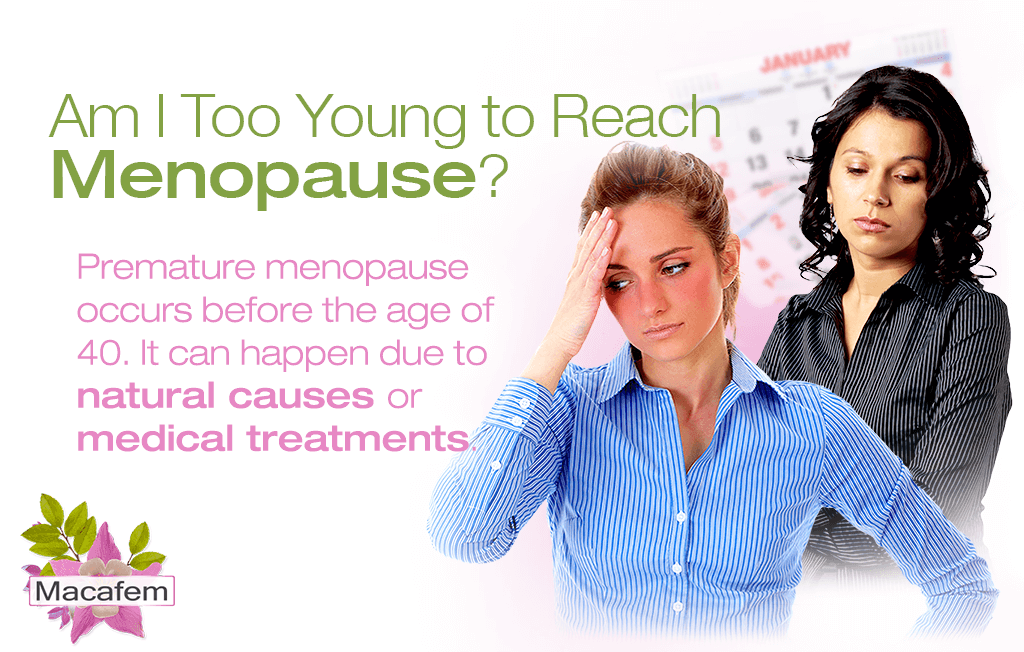Am I Too Young to Reach Menopause?
Hot flashes, mood swings, and night sweats – when these symptoms hit, women know that the menopause transition is in full swing. These symptoms can be alarming to younger women who want to have children but haven’t yet or those who haven’t reached middle age yet. While uncommon, it is possible for younger women to go through the menopause transition early and experience the symptoms that go along with it.
Macafem isn’t just for middle-aged women; it can help women with any form of hormonal imbalance no matter their age. Menopause can be a confusing time, especially if it comes earlier than expected. The Macafem community supports all women during their transition as they strive towards better health. To help clear up confusion about early menopause, check out the info below.

Average Age of Menopause
In the U.S., the average age at which a woman experiences menopause is 51. This is considered the day exactly one year from her last menstrual period. Before menopause happens, women experience a transitional stage known as perimenopause, which is when the bulk of menopause symptoms appear. Since perimenopause can last 2 – 10 years, it follows that the menopause transition can begin in a woman’s early forties. This is considered natural and within the normal range.
Early Menopause
Menopause is considered early or premature when it occurs before the age of 40. About 1 in 100 women under 40 are affected by this. Although rare, even women in their teens and twenties can experience menopause. It can happen due to natural, uncontrollable causes, or it may be induced by medical treatments.
Natural causes
When a woman’s ovaries stop producing enough hormones, her period will cease and she will experience menopause. When this happens before she is 40, it is referred to as premature ovarian failure. Sometimes, there is no discernable cause, but it may also be the result of genetics or autoimmune diseases.
Medical causes
Some life-saving medical procedures may damage the ovaries and thereby induce menopause.
- Cancer treatments. Chemotherapy and radiation therapy, especially when used to treat reproductive cancers, can damage the ovaries.
- Bilateral oophorectomy. In this surgical procedure, both ovaries are removed to treat or prevent ovarian cancer. The operation immediately induces menopause.
- There are various types of hysterectomy, and they differ by how much of the reproductive system is removed along with the uterus. In a radical hysterectomy, the ovaries are also removed, resulting in early menopause. Even in other types of hysterectomy, the blood vessels to the ovaries can get damaged during the procedure, which can lead to premature ovarian failure.
Women may be younger than the normal age range, but it is still possible for them to experience menopause. However, young women who are experiencing menopause symptoms or haven’t had a period in months – even though they haven’t undergone one of the above treatments – should see their doctor to make sure something else isn’t at play.
Unfortunately, women who experience menopause early usually have stronger menopause symptoms, especially if the change in hormone production is sudden. While early menopause typically cannot be stopped, you can counteract the effects of low hormone levels by combining Macafem with a healthy lifestyle. Read more about Macafem benefits.
National Health Service. (2014). Early menopause: Johanna's story. Retrieved November 23, 2016, from http://www.nhs.uk/Livewell/menopause/Pages/Prematuremenopause.aspx
National Institute on Aging. (2016). Menopause. Retrieved November 23, 2016, from https://www.nia.nih.gov/health/publication/menopause
Office on Women’s Health. (2010). Early menopause (premature menopause). Retrieved November 23, 2016, from https://www.womenshealth.gov/menopause/early-premature-menopause/

